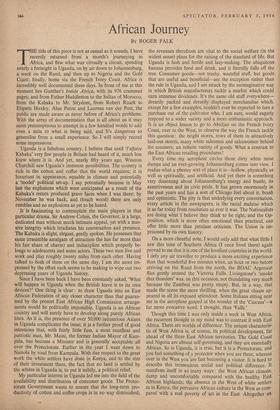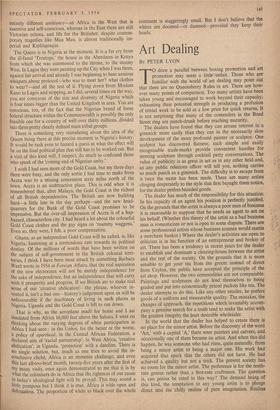African Journey
BY ROGER FALK THE title of this piece is not as casual as it sounds. I have recently returned from a month's journeying in Africa, and flew what was virtually a circuit, spending nearly a fortnight in Uganda, on by air down to Johannesburg, a week on the Rand, and then up to Nigeria and the Gold Coast; finally, home via the French Ivory Coast. Africa is incredibly well documented these days. In front of me at this moment lies Gunther's Inside Africa, with its 976 crammed pages; and from Father Huddleston to the Sultan of Morocco, from the Kabaka to Mr. Strydom, from Robert Ruark to Elspeth Huxley, Alan Paton and Laurens van der Post, the public are made aware as never before of Africa's problems. With the array of documentation that is all about us it may seem presumptuous to attempt in a few hundred words to add even a mite to what is being said, and It's dangerous to generalise from a small experience. So I will simply record some impressions.
Uganda is a fabulous country. I believe that until Tagaire Kabaka' very few people in Britain had heard of it, much less knew where it is. And yet,, nearly fifty years ago, Winston Churchill saw Uganda's immense possibilities. The country is rich in the cotton and coffee that the world requires; it is luxuriant in appearance, equable in climate and potentially a 'model' political set-up. I say potentially because in May last the explosions which were anticipated as a result of the Kabaka's return produced grave faces when I was there; by November he was back, and (touch wood) there are only rambles and no explosions as yet to be heard.
It is fascinating to contemplate the main players in that particular drama. Sir Andrew Cohen, the Governor, is a large, dedicated man without much intimate appeal, yet with a mas- sive integrity which irradiates his conversation and presence. The Kabaka is slight, elegant, gently spoken. He possesses that same irresistible amalgam of attraction (he has far more than his fair share of charm) and indiscipline which properly be- longs to adolescents and some actors. These two men live and work and play roughly twenty miles from each other. Having talked to both of them on the same day, ram the more im- pressed by the effort each seems to be making to wipe out two depressing years of Uganda history.
Since I have been back I have been constantly asked, 'What will happen in Uganda when the British leave it to its own devices?' One thing is clear : to draw Uganda into an East African Federation of. any closer character than that guaran- teed by the present East African High Commission arrange- ments would be politically impossible. Uganda is an African country and will surely have to develop along purely African lines. As it is, the presence of over 50,000 industrious Asians in Uganda complicates the issue; it is a further proof of good intentions that, with fairly little fuss, a most excellent and patriotic man, Mr. Maini, the former Indian Mayor of Kam- pala, has become a Minister and is generally acceptable all over the Protectorate. Earlier in the year I went down to Nairobi by road from Kampala. With due respect to the great work the white settlers have done in Kenya, and to the size of their investment there, the fact that no land is settled by the whites in Uganda is, to put it mildly, a political relief.
My particular interest in Uganda led me into the field of the availability and distribution of consumer goods. The Protec- torate Government wants to ensure that the long-term pro- ductivity of cotton and coffee crops is in no way diminished; the revenues therefrom are vital to the social welfare (in the widest sense) plans for the raising of the standard of life. But Uganda is lush and fertile and lazy-making. The ubiquitous banana provides food and drink, and it literally falls off the tree. Consumer goods—not trashy. wasteful stuff, but goOds that are useful and beneficial—are the exception rather than the rule in Uganda, and I am struck by the unimaginative way in which British manufacturers tackle a market which could earn immense dividends. It's the same old stuff everywhere— drearily packed and drearily displayed merchandise which. except for a few examples, couldn't ever be expected to lure a purchase out of the cultivator who. I am sure, would eagerly respond to a wider variety and a more enthusiastic approach. It is an object lesson to go to Abidjan on the French Ivory Coast, over to the West, to observe the way the French tackle this question : the bright stores, rows of them in attractively laid-out streets, many white salesmen and saleswomen behind the counters; an infinite variety of goods. What a contrast to the East African retailing procedures !
Every time my aeroplane circles those dirty white mine dumps and an ever-growing Johannesburg comes into view. I realise what a phoney sort of place it is—hollow, physically as well as spiritually. and artificial. And yet there is something very disarming about Johannesburg's energy and bustle, its assertiveness and its civic pride. It has grown enormously in the past years and has a sort of Chicago feel about it, brash and optimistic. The pity is that underlying every conversation, every article in the newspapers, is the racial malaise which is as far today from resolution as ever it was. The Nationalists are doing what 1 believe they think to be right, and the Op- position, which is more often emotional than practical, can offer little more than petulant criticism. The Union is im- prisoned by its own history.
On a more cheerful note, I would only add that what little I saw this time of Southern Africa (I once lived there) again proved to me that it is one of the loveliest countries in the world. I defy any air traveller to produce a more exciting experience than that wonderful five minutes when, an hour or two before arriving on the Rand from the north, the BOAC Argonaut flies gently around the Victoria Falls. Livingstone's 'smoke that thunders' was, on this occasion, not thundering very much because the Zambesi was pretty empty. But, in a way, that made the scene the more thrilling, when the great chasm ap- peared in all its exposed splendour. Some Italians sitting near me in the aeroplane gasped at the wonder of the `Cascata'—a far more evocative word, I thought, than 'Falls.'
Though this time I was only inside a week in West Africa, the recurrent thought in my mind was to contrast it with East Africa. There are worlds of difference. The unique characteris- tic of West Africa is, of course, its political development, far ahead of the three East African territories. The Gold Coast and Nigeria are almost self-governing, and they are essentially African. So is Uganda, it is true, but it is a Protectorate, and you feel something of a protector when you are there, whereas over in the West you are fast becoming a visitor. It is hard to describe this tremendous social and political difference. It manifests .itself in so many ways : the West African climate, damp and uncomfortable compared with the healthy East African highlands; the absence in the West. of white settlers as in Kenya; the pervasive African culture in the West as com- pared with a real poverty of art in the East. Altogether all entirely different ambiance—an Africa in the West that is assertive and self-conscious, whereas in the East there are still Victorian echoes, and life for the Britisher, despite contem- porary tragedies like Mau Mau, is almost traditionally im- perial and Kiplingesque.
The Queen is in Nigeria at the moment. It is a far cry from the ill-fated 'Treetops,' the house in the Aberdares in Kenya from which she was summoned to the throne, to the steamy West. In Lagos they were painting up the City when I was there, against her arrival and already I was beginning to hear anxious whispers about protocol—who was to meet her? what clothes to wear?—and all the rest of it. Flying down from Moslem Kano to Lagos and stopping, as I did, several times on the way, you are conscious of the size and diversity of Nigeria which is four times bigger than the United Kingdom in area. You are conscious, too, of the fact that the Nigerian brand of loose federal structure within the Commonwealth is possibly the only feasible one for a country of well over thirty millions, divided into three pretty clearly defined main tribal groups.
There is something very stimulating about the idea of the Queen being there at this precise moment in Nigeria's history. It would be rash even to hazard a guess at what the effect will be on the final political plan that still has to be worked out. But a visit of this kind will, I suspect, do much to confound those who speak of the 'coming end of Nigerian unity.'
I wisli I had seen more of the Gold Coast, but my three days there were busy, and the only sortie I had time to make from Accra was to a mining concession sixty miles north of the town. Accra is an unattractive place. This is odd when it is remembered that, after Malaya, the Gold Coast is the richest of all British dependencies. The British are now building hard—a little late in the day perhaps—and the new head- quarters for the Bank of the Gold Coast promises to be impressive. But the over-all impression of Accra is of a hap- hazard, characterless city. I had heard a lot about the colourful Gold Coast clothes and the gay signs on 'mammy waggons.' Even so, they were, I felt, a poor compensation.
Ghana, as an independent Gold Coast will be called, is, like Nigeria, hastening at a tremendous rate towards its political destiny. Of the millions of words that have been written on the subject of self-government in the British colonial terri- tories, I think I have been most struck by something Barbara Ward wrote in 1954 in Foreign A fairs. that the real aspiration of the new electorates will not be merely independence for the sake of independence, but an independence that will carry with it prosperity and progress. If we British are to make real. sense of our 'creative abdication'—the phrase. whoever in- vented it, isn't a bad one—history's judgement upon us will be unfavourable if the machinery of living in such places as Nigeria, Uganda and the Gold Coast is left to run down.
That is why, as the aeroplane made for home and I sat insulated from Africa 16,000 feet above the Sahara, q went on thinking about the varying degrees of white participation in Africa I had seen : in the Union, for the better or the worse, a policy of apartheid; in the Central African Federation, a declared aim of 'racial partnership'; in West Africa, 'creative abdication'; in Uganda, 'protection' with a dateline. There is no single solution, but, much as one tries to avoid the in- conclusive cliche, Africa is an immense challenge; and even this last all-too-brief month, twenty-five years after the first of my many visits, once again demonstrated to me that it is by what the colonisers do in Africa that the rightness of our cause in today's idealogical fight will be proved. This may sound a little pompous but I think it is true. Africa is wide open and defenceless. The proportion of white to black over the whole continent is staggeringly small. But I don't believe that the whites are doomed—or damned—provided they keep their heads.



































 Previous page
Previous page